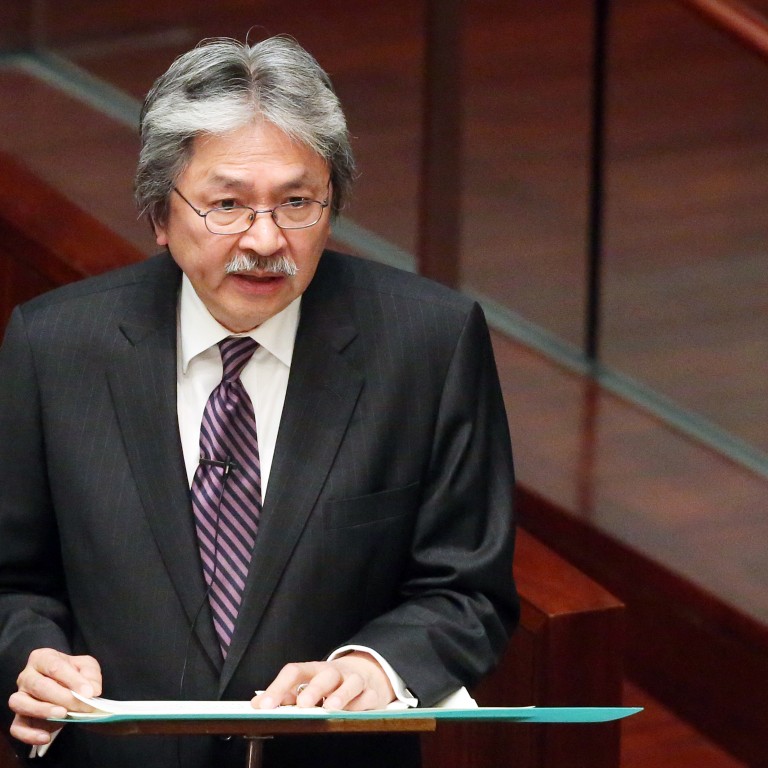
John Tsang’s problem of plenty
As the first Hong Kong-born American to be recruited into Hong Kong’s civil service, John Tsang exuded an aura of unflashy confidence, pausing in mid speech as he reached for his glass of water during the now-sacred Legislative Council tradition – the unceremonial ejection of opposition politician Long Hair (whose silvering hair is actually now beautifully coiffured).
His budget was competent in parts – often striving to do the best for Hong Kong, yet spoilt by gimmicky giveaways driven by lobby groups coloured by their view of “what’s best for me is best for Hong Kong”.
Much of his expenditure of our money is very respectable. Education takes a whopping 22 per cent of spending; social welfare in the home of capitalism takes 18 per cent; infrastructure 17 per cent; and health care 16. Though the Zhuhai Bridge to nowhere is worth two years of infrastructure spending in itself. Security, in a city with no defence costs, is an eyebrow-raising 10 per cent.
Yet other giveaways are mystifying: the giving of freebies to “industries hurt by Occupy Central” – while struggling to find any in pain. Tax breaks are given to private equity managers – who boast among their practitioners not just some of the richest people in Hong Kong, but in the world! Yet needy government departments remain starved of a little investment because their overpaid bosses are too embarrassed to ask for it.
Speaking to furrowed-browed tax professionals, the key question is, “why does Hong Kong’s financial secretary keep getting his budget estimates so wrong?” In the last eight budgets, this most practiced of financial secretaries has underestimated his budgets every time. If you add up his estimates over his lengthy tenure, against the surpluses that his management has actually achieved, there is now a HK$400 billion difference. On average he receives around US$50 billion a year more than he spends – not bad for a balanced budget.
Now surprise surpluses are always a better surprise than surprise deficits. The extraordinary thing is that it has happened year after year. It is impossible for those of us who read the tea leaves to see what signal is being sent to the market.
Caution, incompetence, the management of expectations, perhaps even no signal? It is not easy predicting how 7 million MTR-riding, phone gazing, hard-working, information hungry Hongkongers are going to react, but most of the major accounting firms reckon that they can get within 10 per cent of the actual outcome.
At last for next year, the financial secretary is predicting a surplus of HK$37 billion – much more in line with his historical performance – but what signal is that telling us? Realism, capitulation, confidence, perhaps even the recruitment of a spreadsheet expert?
These surpluses all go into the reserves, which are now standing at HK$819 billion, rising this year to HK$856 billion, global financial crises excepted. That is equivalent to the size of Hungary’s economy. Held by a city.
Instead of gimme giveaways, the government needs to invest more. John Tsang holds an exceptional opportunity to turn our massive nest egg into an investment
The Basic Law is intended to remain in force until June 30, 2047, still some 32 years off and perhaps too far away for us to get really worked up about. Article 106 says that the SAR “shall have independent finances”, which shall be used “exclusively for its own purposes and they shall not be handed over to the Central People’s Government”. Hong Kong money is for the use of Hong Kong people. A generous concession granted by our sovereign power. But we only have 32 years to figure out what to do with it.
There are dire prophesies that we need a pot of gold big enough to meet the needs of ageing dependants, though perhaps one way to deal with that is to raise the retirement age to over 60 – a milestone which the financial secretary passed a while ago. As things stand however, the government can continue to tax salaries, and profits, and transactions, and land; ad pretty-well infinitum.
Simple maths tells us that we could live with annual deficits of HK$27 billion from now until 2047. That pays for an awful lot more and better sheltered housing, health care and education. Instead of gimme giveaways, the government needs to invest more.
John Tsang holds an exceptional opportunity to turn our massive nest egg into an investment. Perhaps by establishing a citywide provident fund for permanent residents (like Singapore’s), a health fund, or an environment fund to improve our filthy air – all things in which the government and the people of Hong Kong together can literally hold an equity stake. Fatherly handing cash to the disadvantaged, to special interest groups, and to loud mouths has failed elsewhere and is passé; so seventies.
John, cast off failed 1970s patrician ideas, cast off choking government bureaucracy, and use your MIT and Harvard education to create some bold initiatives! The third longest serving financial secretary since 1937 must use it – or lose it.
Richard Harris is chief executive of Port Shelter Investment Management

